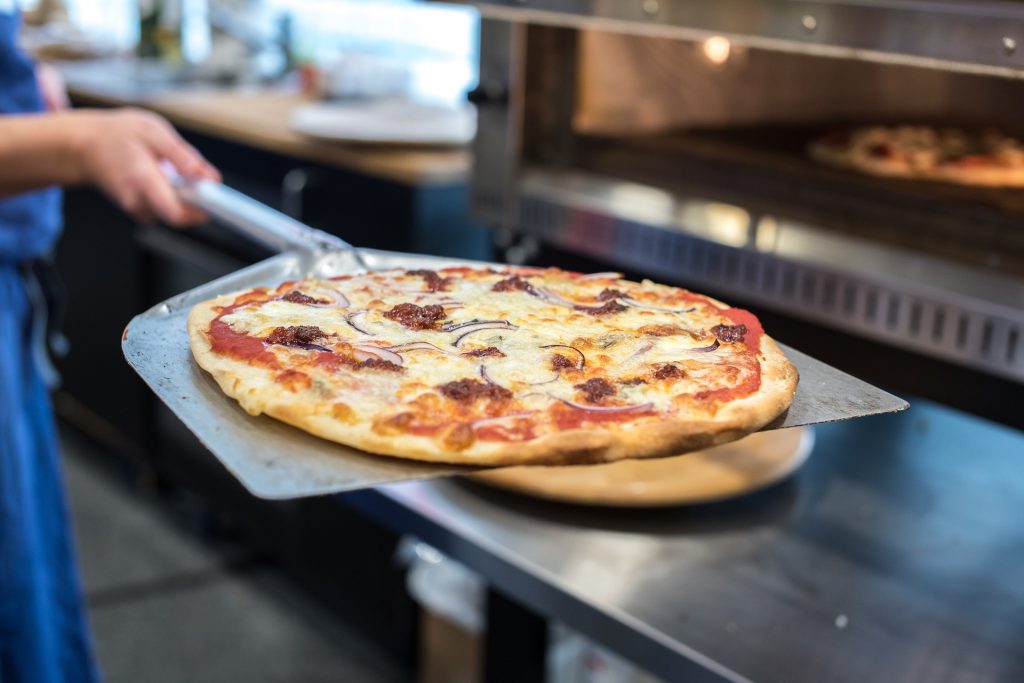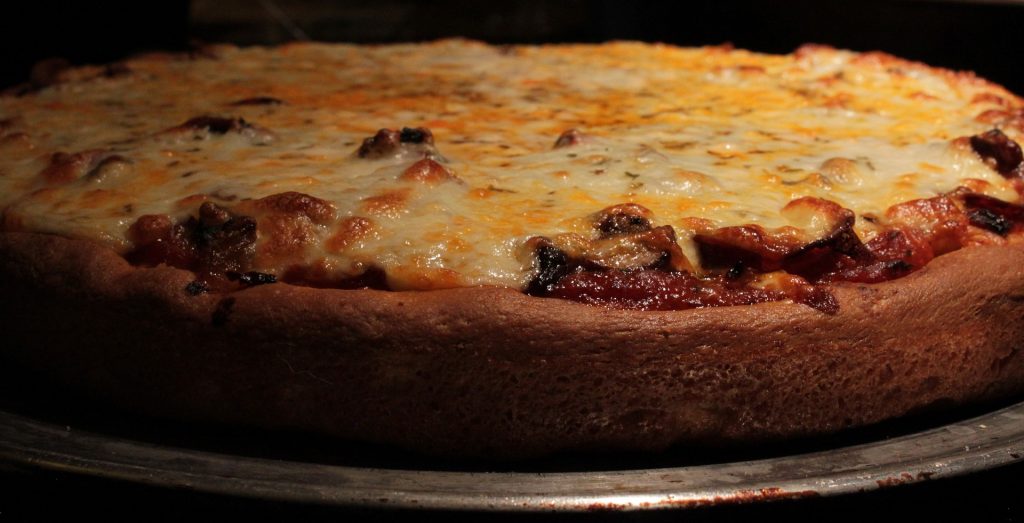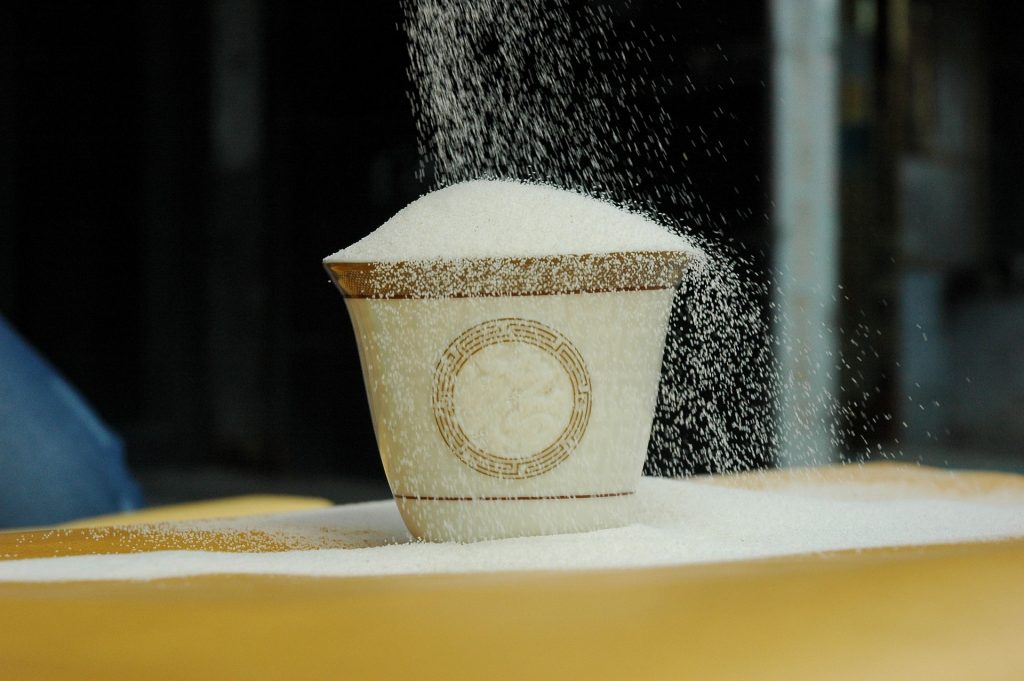Using cornmeal on the pizza stone is a common way to prevent the pizza from sticking, but do you really need it? And are there any other, better ways to prevent sticking?
You don’t actually need cornmeal on your pizza stone. I would even recommend to avoid it. The reason is that the pizza will not stick to the pizza stone if it’s properly heated. A hot pizza stone will crisp the pizza, making it easy to slide your
What Is Cornmeal?
Cornmeal is a type of meal, or coarse flour, made from ground corn. Cornmeal can be found in several levels of coarseness: fine, medium, and coarse. But even the finest grind is coarser than e.g. wheat flour.
The Reason People Use Cornmeal on Pizza Stones
The main reason people use cornmeal on their pizza stone is to prevent the pizza from sticking.
Cornmeal is often used to dust pizza stones to protect the pizza from sticking by creating a protective layer between the crust and the stone. The reason cornmeal is used instead of just plain flour is that it’s coarser, making it easier to slide the pizza on and off the pizza stone.
Cornmeal is also pretty commonly used to prevent the pizza from sticking to the
Another reason you may want to add cornmeal is for the flavor and texture. Many people I’ve talked to enjoy the flavor the cornmeal adds to the pizza crust, and is one of the main reasons they use it.
What Kind of Cornmeal Do You Use for Pizza Stones?
As already mentioned, the reason cornmeal is used is the coarseness. That being said, coarser isn’t necessarily better. So if you’re using cornmeal for your pizza stone or
Why You Don’t Need Cornmeal on Your Pizza Stone
This might surprise you, but pizza sticking to the pizza stone is actually not a problem if you use the pizza stone correctly!
The Pizza Will Not Stick With Correct Use of Your Pizza Stone
Using of cornmeal or other types of dusting, such as flour, is only one of the things I see people do to prevent pizza from sticking to their pizza stone. Others use parchment paper (read why that’s not a good idea here), or aluminum foil. But all those people are doing, is trying to solve a problem that doesn’t even exist!
If the stone is hot enough when you’re baking your pizza, it will get crispy (just like you want, right?), and not stick to the pizza stone! So if you experience that the pizza sticks, it simply means the pizza stone isn’t hot enough. Probably you haven’t preheated the stone long enough. I can’t stress enough the importance of pre-heating the pizza stone. I recommend preheating the pizza stone for at least 45 minutes to 1 hour before you attempt to bake any pizzas. The surface temperature of the stone also drops when you bake many consecutive pizzas, you should therefore also let the stone re-heat after every 2 pizzas. If you want to read more about how to properly preheat your pizza stone, check out this article.
That said, cornmeal can still be useful for pizza baking. Especially when you transfer the pizza from the counter to the oven, dusting your
Cornmeal Can Still Be Useful for Pizza Baking!
Even though I don’t recommend using cornmeal on your pizza stone, it can be useful for your
Pizza Peel
Cornmeal works great to prevent pizza from sticking to the
Firstly, you should not use a super sticky dough, this will definitely cause problems. You should also avoid adding too much sauce, cheese, and other topping to the pizza, as this will make the dough more moist and stick more. You should also try to avoid leaving the raw pizza on the
But to make sure the pizza doesn’t stick to the peel, you can also add flour or cornmeal to the peel before you add the pizza. This will create a barrier between the dough and allow the pizza to slide off more easily.

Pizza Pan
Another use of cornmeal is when you’re baking pizza in a pizza pan. I always drizzle some cornmeal in my Chicago pizza pan when I’m making Chicago-style deep-dish pizza (check out our recipe). Since I already use cornmeal in the pizza dough, it doesn’t add any different flavor to the dough. And the cornmeal prevents the pizza from sticking to the pan. The pizza is also baked at a lower temperature, so I don’t need to worry about the cornmeal burning.

Cornmeal vs Semolina
Semolina is a more traditional option for dusting the

The main benefit of semolina is that it doesn’t burn as easily in the oven. Cornmeal can be a good option if you’re baking your pizza at a lower temperature, like a pan pizza. But for a pizza stone, this can be a problem. When you’re baking on a pizza stone, you want it to be really hot, like a
Cornmeal typically adds more texture and flavor to the pizza than semolina. Semolina has a more neutral flavor, and you’ll not notice it as much as cornmeal.
Semolina is my preferred option for dusting my
- Is Your Pizza Dough Too Dry? Here is How to fix it! - June 10, 2024
- The Ultimate Guide to the Pizza Dough Windowpane Test - June 8, 2024
- The Ultimate Guide to Autolyse Pizza Dough - June 7, 2024
